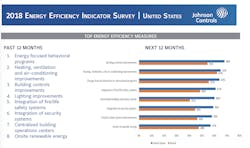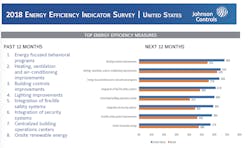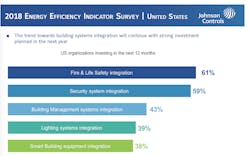Johnson Controls 2018 Energy Efficiency Indicator Survey: Global Spending on Energy Efficiency to Increase in Coming Year
MILWAUKEE – (November 15, 2018) – Today, Johnson Controls, a global leader in creating smart cities, unveiled the findings from its 2018 Energy Efficiency Indicator (EEI) survey, revealing that U.S. organizations are planning to increase investments in smart building measures including building controls and building systems integration at a greater rate than more traditional energy efficiency measures.
The survey of nearly 2,000 facility and energy management executives from 20 countries found that 57 percent of organizations in the United States and 59 percent of global organizations plan to increase investment in energy efficiency in the next year.
Over the past decade, traditional energy efficiency measures – such as HVAC equipment improvements and lighting upgrades – have become table stakes for many organizations. Today, organizations identify greenhouse gas footprint reduction, energy cost savings, energy security and enhanced reputation as key drivers of investment fueling growth in green, net zero energy and resilient buildings.
Smart Buildings Driving Future Investment
Building controls improvements were cited as the most popular investment for the next 12 months among U.S. organizations, with 68 percent of respondents planning to implement this measure. Building system integration saw a 23 percent increase in respondents planning to invest in 2019 compared to 2018, the largest increase of any measure in the survey.
“Organizations are more interested than ever in leveraging energy efficiency, energy storage and distributed generation technologies to deliver smarter, safer and more sustainable
buildings,” said Clay Nesler, vice president, Global Sustainability, Johnson Controls. “U.S. organizations are especially bullish about the future impact of systems interoperability, systems integration and cybersecurity technologies, leading all other countries.”
Due to increasingly severe weather incidents around the world, the 2018 EEI results also highlight a growing global focus on resilience and energy security. One third of U.S. and global organizations (32 percent and 33 percent respectively) believe the ability to maintain critical operations during severe weather events or extended power outages is extremely important when considering future energy and building infrastructure investments. Roughly half of U.S. and global organizations (54 percent and 50 percent respectively) are extremely or very likely to have one or more facilities able to operate off the grid in the next ten years, a ten percent increase in the U.S. from last year. Globally, plans to invest in distributed energy generation, electric energy storage and on-site renewables also increased year-over-year.
2008 vs. 2018: Increased Interest and Investment in Sustainable Buildings
Analysis of the annual survey results from 2008 to 2018 revealed dramatic shifts in energy efficiency goals, actions and investments throughout the past decade.
In 2008, very few respondents (8 percent) had any certified green buildings and only one-third (34 percent) planned to certify new construction projects to a recognized green standard. This year, 19 percent of U.S. organizations have already achieved voluntary green building certification for at least one of their facilities, and 53 percent plan to in the future, a combined increase of 31 percent over the past year alone. Globally, 14 percent of organizations have achieved voluntary green building certification for at least one of their facilities and 44 percent plan to in the future.
In 2008, less than one-third of respondents (30 percent) believed green buildings would be very important in attracting and retaining future employees, but in 2018, 44 percent of U.S. organizations, and 51 percent globally, are willing to pay a premium to lease space in a certified green building.
The survey also saw a significant year-over-year increase in net zero energy goals, with 61 percent of U.S. organizations extremely or very likely to have one or more facilities that are nearly zero, net zero or positive energy/carbon in the next ten years, up 14 percent from last year.
To download the full results, please visit THIS LINK.
About the Energy Efficiency Indicator (EEI) Survey:
The 2018 EEI survey is Johnson Controls’ 12th edition global survey analyzing energy efficiency, renewable energy, building systems integration and smart city plans, practices and investments among executive-level building and city decision makers. The 2018 survey respondents include over 1,900 facility and energy management executives from 20 countries, representing the world's major economic regions and a variety of commercial, institutional and government facility portfolios. These countries include Argentina, Brazil, Canada, Chile, China, Colombia, France, Germany, India, Ireland, Italy, Japan, Mexico, Netherlands, South Africa, South Korea, Spain, Switzerland, the United Kingdom and the United States.
About Johnson Controls
Johnson Controls is a global diversified technology and multi-industrial leader serving a wide range of customers in more than 150 countries. Our 120,000 employees create intelligent buildings, efficient energy solutions, integrated infrastructure and next generation transportation systems that work seamlessly together to deliver on the promise of smart cities and communities. Our commitment to sustainability dates back to our roots in 1885, with the invention of the first electric room thermostat. We are committed to helping our customers win and creating greater value for all of our stakeholders through strategic focus on our buildings and energy growth platforms. For additional information, visit http://www.johnsoncontrols.com or follow JCI on Twitter: @johnsoncontrols.
About Johnson Controls Building Technologies & Solutions
Johnson Controls Building Technologies & Solutions is making the world safer, smarter and more sustainable – one building at a time. Our technology portfolio integrates every aspect of a building – whether security systems, energy management, fire protection or HVACR – to ensure that we exceed customer expectations at all times. We operate in more than 150 countries through our unmatched network of branches and distribution channels, helping building owners, operators, engineers and contractors enhance the full lifecycle of any facility. Our arsenal of brands includes some of the most trusted names in the industry, such as Tyco®, YORK®, Metasys®, Ruskin®, Titus®, Frick®, PENN®, Sabroe®, Simplex® and Grinnell®. For more information, visit www.johnsoncontrols.com or follow @JCI_Buildings on Twitter.


